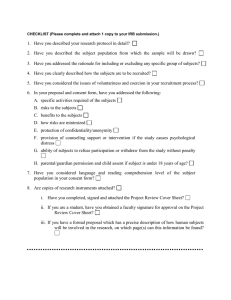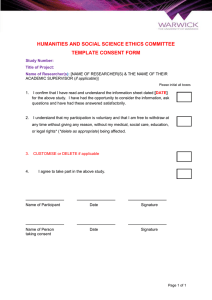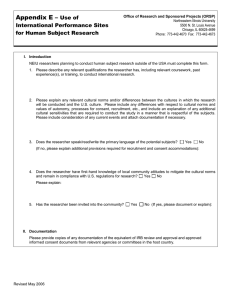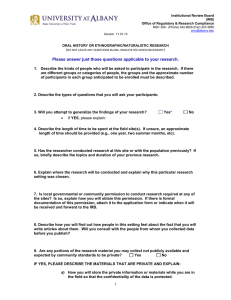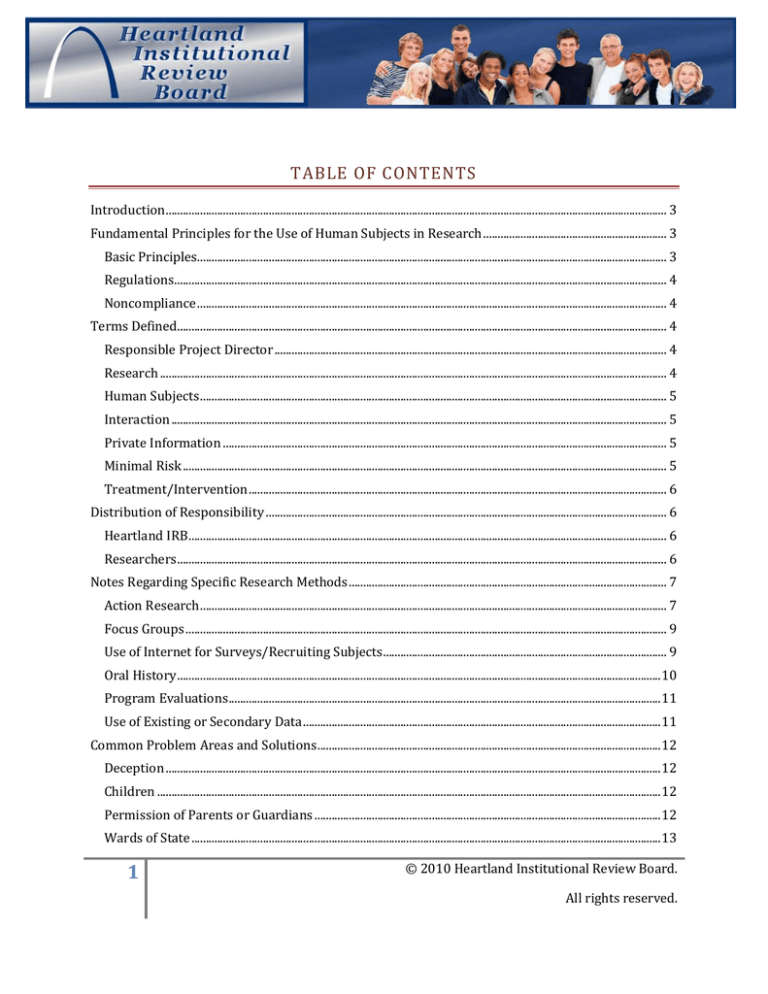
TABLE OF CONTENTS
Introduction ............................................................................................................................................................................... 3
Fundamental Principles for the Use of Human Subjects in Research ................................................................ 3
Basic Principles.................................................................................................................................................................... 3
Regulations ............................................................................................................................................................................ 4
Noncompliance .................................................................................................................................................................... 4
Terms Defined........................................................................................................................................................................... 4
Responsible Project Director ......................................................................................................................................... 4
Research ................................................................................................................................................................................. 4
Human Subjects ................................................................................................................................................................... 5
Interaction ............................................................................................................................................................................. 5
Private Information ........................................................................................................................................................... 5
Minimal Risk ......................................................................................................................................................................... 5
Treatment/Intervention .................................................................................................................................................. 6
Distribution of Responsibility ............................................................................................................................................ 6
Heartland IRB ....................................................................................................................................................................... 6
Researchers ........................................................................................................................................................................... 6
Notes Regarding Specific Research Methods ............................................................................................................... 7
Action Research ................................................................................................................................................................... 7
Focus Groups ........................................................................................................................................................................ 9
Use of Internet for Surveys/Recruiting Subjects ................................................................................................... 9
Oral History ......................................................................................................................................................................... 10
Program Evaluations ....................................................................................................................................................... 11
Use of Existing or Secondary Data ............................................................................................................................. 11
Common Problem Areas and Solutions ........................................................................................................................ 12
Deception ............................................................................................................................................................................. 12
Children ................................................................................................................................................................................ 12
Permission of Parents or Guardians ......................................................................................................................... 12
Wards of State .................................................................................................................................................................... 13
1
© 2010 Heartland Institutional Review Board.
All rights reserved.
Assent of Children ............................................................................................................................................................ 13
Waiver of Permission and Assent .............................................................................................................................. 14
Persons with Limited Capacity to Consent and Other Limitations .............................................................. 14
Dual Relationships: Students, Trainees, Clients, and Employees as Participants .................................. 15
External Agency Deadlines and HIRB Review ...................................................................................................... 17
Prisoners .............................................................................................................................................................................. 17
Non-English Speaking Subjects ................................................................................................................................... 18
Research in Foreign Countries .................................................................................................................................... 18
2
© 2010 Heartland Institutional Review Board.
All rights reserved.
INTRODUCTION
This Researcher’s Guide was prepared to provide researchers, project directors, and
program evaluators with important information regarding the basics of research and
evaluation prior to engaging in the HIRB submission process. It reviews basic principles
and policies related to the use of human subjects in research and program evaluation,
and common problems that researchers encounter during the submission process.
FUNDAMENTAL PRINCIPLES FOR THE USE OF HUMAN SUBJECTS IN
RESEARCH
BASIC PRINCIPLES
The National Commission for the Protection of Human Subjects of Biomedical and
Behavioral Research published in 1978 "The Belmont Report: Ethical Principles and
Guidelines for the Protection of Human Subjects of Research." This report sets forth the
following basic ethical principles underlying the acceptable conduct of research
involving human subjects: respect for persons, beneficence and justice.
Respect for persons recognizes the personal dignity and autonomy of individuals, and
requires special protection of those persons with diminished autonomy, e.g., children,
people in human service settings, prisoners. Researchers must get full consent from
individuals before conducting research. Full consent involves the following:
Informing subjects/participant about the research procedures, the
purpose of the research, and the risks and anticipated benefits.
Providing subjects/participants an opportunity to ask questions and to
withdraw from the research at any time without penalty.
Ensuring that consent is truly voluntary; that is, researchers should not
coerce or use undue influence to get subjects to participate.
Beneficence concerns an obligation to protect persons from harm by maximizing
benefits and minimizing possible risks. The appropriateness of involving vulnerable
populations must be demonstrated, and the consent process must thoroughly and
completely disclose relevant risks and benefits.
Justice requires that the benefits and burdens of research be distributed fairly.
Researchers should not select subjects simply because they are readily available or
3
© 2010 Heartland Institutional Review Board.
All rights reserved.
because they are vulnerable based on illness, age, education level, or socioeconomic
condition. Justice also requires that research not overburden individuals who are
already burdened by their environments or their conditions.
REGULATIONS
The federal government regulates research with human subjects. The Code of Federal
Regulations (45 CFR 46) incorporates the ethical principles described in the Belmont
Report and guides HIRB.
NONCOMPLIANCE
Once researchers or program evaluators receive from approval for their protocols by
HIRB, they are responsible for following said protocols and complying with HIRB
decisions and assurances. Failure to comply will be reported to the Office for Human
Research Protections, the federal agency at Department of Health and Human Services
that oversees research with human subjects as well as the funding agency.
TERMS DEFINED
RESPONSIBLE PROJECT DIRECTOR
A “responsible” project director is a qualified program evaluator, project manager or
researcher who monitors any research project or data collection for program evaluation
purposes that involves human subjects.
RESEARCH
For the purposes of the IRB and federal regulations, the term research refers to any
systematic gathering and analysis of information designed to develop or contribute to
generalizable knowledge. Research includes:
Interviews, surveys, tests, or observations that are designed to gather
nonpublic information about individuals or groups.
Studies of existing data, either public or private, where the identity of
individuals is known.
4
© 2010 Heartland Institutional Review Board.
All rights reserved.
Studies designed to change subjects' physical or psychological states or
environments.
The purpose of gathering the data is one way to determine whether the project is
generalizable. If the researcher intends to publish the results or present the information
at a public meeting, the project is designed to contribute to a wider audience and is,
therefore, generalizable. Using this definition of research, some demonstration and
service programs may include research activities.
Most internal program evaluations to determine participant satisfaction or knowledge
gained during a routine program activity do not meet the federal definitions of research.
If the evaluators' intention is to publish the results of the evaluation that alters the
evaluation to generalizable knowledge, and the data collection protocols should be
reviewed for the project.
HUMAN SUBJECTS
Human subjects are living individuals about whom a researcher obtains (a) data by
intervention or interaction with the individual, or (b) identifiable private information.
The private information may include the collection or study of existing data, documents
or records, pathological specimens, or diagnostic specimens.
INTERACTION
Any communication or interpersonal contact between the investigator and a subject is
considered interaction.
PRIVATE INFORMATION
Private information includes Information about behavior that occurs in a context in
which an individual can reasonably expect that no observation or recording is taking
place is considered private information. Also, information that has been provided for
specific purposes by an individual and which the individual can reasonably expect will
not be made public is also considered private information.
MINIMAL RISK
5
© 2010 Heartland Institutional Review Board.
All rights reserved.
The probability and magnitude that physical or psychological harm that is typically or
normally encountered in the daily lives, or in the routine medical, dental, or
psychological examination of a healthy person all falls under minimal risk. Minimal risk
is affected by the context of the research, including characteristics of the subjects.
TREATMENT/INTERVENTION
A treatment is something that is administered to a subject or the subject’s environment
is manipulated for purposes of research. Physical procedures through which data are
gathered is considered intervention.
DISTRIBUTION OF RESPONSIBILITY
HEARTLAND IRB
Ultimately, the researcher is responsible for all that occurs within a research project
however, HIRB also has some responsibilities. HIRB is responsible for reviewing
submitted research and program evaluation protocols. Once approved, HIRB will
conduct a project review at least once during a multi-year project to ensure compliance
with the protocols. HIRB will provide any approval documentation required by a
funding agency.
RESEARCHERS
The individual(s) responsible for conducting or supervising the research has/have the
primary responsibility for protecting the rights of human subjects. Responsible project
directors who supervise said research projects accept full responsibility for the work that
is done under their direction and ensure that all personnel executing the protocols are
trained and comply with the letter and the spirit of all federal regulations regarding
human subjects research as well as HIRB policies.
1. Modifications: If any changes need to be made in a protocol, the researcher will
submit a written request to the HIRB describing the modifications. No change in
procedures may be made without prior written approval from HIRB. If the modification
requires a new consent form, interview protocol, or survey questions, the researcher
must submit the new forms with the changes highlighted or in bold type. These
modifications will be reviewed at the appropriate level by HIRB. If the changes are
6
© 2010 Heartland Institutional Review Board.
All rights reserved.
minor, only one person will need to review it; if the changes are extensive or if the initial
review was a Level 2 review, then it may have to be reviewed by the full committee.
2. Consent forms: The researcher will provide a copy of the HIRB-approved consent
form to each subject or guardian at the time of consent, unless HIRB has specifically
waived this requirement. The researcher will retain signed consent forms in a secure
location separate from the data for at least three years after the completion of the
research.
3. Adverse events: Adverse events include unanticipated side effects or any injuries
sustained as a result of the research. The researcher will immediately report all adverse
events to HIRB at contact information goes here.
4. Continuation reviews: The length of the approval will be determined by the HIRB but
will not exceed one year. If the research is not completed within the allotted time, the
researcher must request an extension to continue the research. Extension forms are
available online from HIRB.
NOTES REGARDING SPECIFIC RESEARCH METHODS
ACTION RESEARCH
Action Research that is typically conducted in schools and human service organizations
will also be reviewed by Heartland IRB. HIRB has developed some guidelines for
researchers.
1. Background
Program Evaluators and various other for-profit or non-profit organizations conduct
research in either formal or informal learning settings as well as a variety of other
human service-related settings. Both settings define goals and allow the professionals
wide latitude to implement strategies to achieve those goals, as long as the strategies fall
within the constraints of relevant policies, ethics, and professional standards. Neither
parental/guardian or student/client assent is required for standard activities in the
settings.
Federal Regulations state that IRBs may waive written consent for research when the
"research presents no more than minimal risk of harm to subjects and involves no
7
© 2010 Heartland Institutional Review Board.
All rights reserved.
procedures for which written consent is normally required outside the research
context." [46.117(c)(2)] If the research activity is consistent in intent and method with
what individuals already experience in their school or human service facility, it does not
require consent or assent in those settings. Sometimes the school or service organization
requires consent and assent, and SIUC researchers should comply with all relevant
policies, practices, and requests from the setting where the research will be conducted.
However, many research activities conducted in schools and human service
organizations are not consistent with the individuals' educational or service goals, or the
research procedures do not fall within the range of acceptable practice in their setting.
Those activities will require consent and assent, as applicable, and be reviewed
accordingly. Examples of research that may not be consistent with educational goals are
surveys or focus groups about students' personal behaviors like drug use, sexual
activities, favorite television shows. Examples of research in a human service
organization that may not be consistent with service goals are studies on basic biological
or psychological processes, or attitudes without direct benefit to the individual
participants.
2. Policy
Parental/guardian permission and participant consent/assent are not required in
schools and human service organizations if the research activity is (a) consistent with
participants' educational or service goals, AND (b) employs procedures that fall within
the range of accepted practice for that population and setting.
HIRB will review and make the final decision on the need for parental/guardian consent
during the review process.
3. Written Approval from Outside Agency, School, or Institution
When research is conducted in an agency, school, or other institution, the researcher
must get signed approval from the designated authority to recruit subjects, conduct the
study, or use existing data at that institution. This signed documentation must be
provided to the HIRB prior to the start of any research. HIRB will not delay the
reviewing process while waiting for said documentation however this approval must be
furnished prior to receiving an official approval letter.
4. Suspected Abuse (Spouse, Child or Elder)
8
© 2010 Heartland Institutional Review Board.
All rights reserved.
A researcher may encounter spousal, child or elder abuse while gathering data for a
research project. If the project involves questions or situations where this information is
likely to be revealed, the researcher may have to report the abuse to the proper
authorities. In these cases, the researcher should include a statement in the consent
form telling the subjects that if the researcher suspects that abuse has occurred, the
researcher will report the suspected abuse to proper authorities.
FOCUS GROUPS
Participants in focus groups must be informed that research information may not be
confidential, because all members of the group will be privy to whatever discussion
occurs during the session. If focus groups are audio/videotaped, all members of the
group must consent to be taped.
An example of a statement that could be used to explain confidentiality in focus groups
is the following: "All reports based on this research and written by the researcher will
maintain the confidentiality of individuals in the groups. Only group data will be
reported and no participant names will be used. Since this is a group process, all
members of the group will be privy to the discussions that occur during the session;
therefore, the researcher cannot ensure that group members will hold this information
confidential."
If the researcher wishes to describe individuals by demographic data, the researcher
must ask permission to do so in the consent form. For example, a researcher may want
to report that a middle-aged minority female said that neighborhood grocery store
prices are too high, and so she shops at the large chain store a mile away from her home.
As long as the researcher describes to the subjects the kind of identifying information
that may be used, and the subjects agree to it, the researcher may use descriptive
information in reports based on the focus group data.
USE OF INTERNET FOR SURVEYS/RECRUITING SUBJECTS
Internet research raises a number of complex issues for the research community. A few
of the problems involved are the risks versus the benefits, consent, confidentiality, and
the participation of minors. Researchers' claims about the benefits of their research
depend in large part on their ability to collect useful data. But conducting research on
the Internet raises questions about data sampling techniques and the validity and
reliability of the data collected. It is easy to mislead the researcher about geographical
9
© 2010 Heartland Institutional Review Board.
All rights reserved.
location, age, race, or gender. Minors may respond to a study involving inappropriate
subject matter without the researcher knowing it.
Although survey research online is similar to traditional survey research, Internet
research increases the subjects' risk of being identified or having their personal
information accessed by people other than the researcher. The risk of exposure can
surface at different stages, from data gathering, to data processing, to data storage and
dissemination. Participants may not know that there is a record of the exchange in a
cache somewhere on their system or saved in their Internet service provider's log files.
All researchers who are using e-mail surveys must add the following information:
The "from" line should be the researcher's name.
The "subject line" should be "Research Request."
The message should state at the outset where the e-mail addresses were
obtained.
Include either a statement saying there will be no future mailings or an
opt-out message that permits addressees to have their names removed from any
future mailings.
If you plan future e-mails, add the statement, "If you do not respond to
this survey or return the opt-out message, you will be contacted again with this
request X times during the next X weeks."
Include the HIRB e-mail address (director@hirb.org) in addition to the
HIRB telephone number (866-618-HIRB) in the last sentence of the HIRB
approval statement.
Use a blind copy format so that the list of recipients will not appear in the
header.
ORAL HISTORY
Oral history usually involves taped interviews between the researcher and participants
about a particular historical event, person or period, with the intention of keeping the
tapes for posterity. These interviews constitute research with humans, and the projects
should be submitted for review. The American Anthropological Association and the
American Sociological Association have guidelines that address ethical issues. Both
associations urge researchers to comply with federal and institutional requirements
pertaining to research.
10
© 2010 Heartland Institutional Review Board.
All rights reserved.
Oral history projects should:
Include information in the consent form about how the tapes will be used
in the future and who will have access to them.
Provide participants an opportunity to have their names removed from the
tapes and kept confidential in any publications.
Provide some way to protect the privacy of any third parties who may be
named in the interview.
There is a special application form for approval of oral-history/field research.
PROGRAM EVALUATIONS
Research that involves program evaluations or quality assurance may or may not need
to be reviewed by the IRB. If the purpose of the project is to develop or contribute to
generalizable knowledge, it should be reviewed by the IRB. If the project is for internal
purposes only, to improve or understand a program, it does not have to be reviewed by
the IRB. For clarification, contact the HIRB office at (866) 618-HIRB to discuss the
details of your project.
USE OF EXISTING OR SECONDARY DATA
If researchers plan to use data that already exist, the IRB must review the research if the
data involve humans. If the data involve documents, records, pathological specimens, or
diagnostic specimens that are publicly available or if the information is recorded so that
subjects cannot be identified directly or indirectly, the research will probably be
reviewed at the Category I level. If the identifiers are recorded, researchers must
describe in the IRB application the procedures they will use to protect the
confidentiality of the subjects. If possible, the identifiers should be removed by a person
who already has access to the data before the researcher gains access to the data.
There is a special application form for research involving the use of existing or
secondary data. See Section 14: Forms for this.
11
© 2010 Heartland Institutional Review Board.
All rights reserved.
COMMON PROBLEM AREAS AND SOLUTIONS
DECEPTION
All other possible research strategies should be explored before deciding upon a
deceptive approach to research. Intentionally misleading or providing misinformation
to participants is not usually a desirable procedure. It exploits the participants'
vulnerability and interferes with their ability to give informed consent. If deception is
the only way that important research can be done, the researcher must explain to HIRB
in the protocol all steps that will be taken to protect the participants from psychological
and physical harm. The missing or misleading information must not put the participants
at risk.
Researchers may inform the participants that the study involves deception without
revealing critical information about the study. For example, a possible quote to use is,
"We cannot tell you every detail of this study ahead of time, but if you are willing to
participate under these circumstances, we will explain the procedure to you fully after
your participation."
When deception is used, thorough debriefing of the participants is essential. A
debriefing statement, which must also be approved by HIRB during the review process,
should describe the deception, the purpose of withholding information, the reason for
the study design, and help the participant address any distress brought on by the
research. Participants must be given the opportunity to withdraw their data at the time
of debriefing if they object to the deception. This procedure will allow participants to
decide if they continue to agree with the aims of the study and the inclusion of their data
in it.
CHILDREN
There are special requirements in the consent process when children participate in
research projects. (A person under the age of 18 is considered a child/minor.)
PERMISSION OF PARENTS OR GUARDIANS
12
© 2010 Heartland Institutional Review Board.
All rights reserved.
Parents or guardians must give written permission before their child can participate in a
research project. All of the elements of informed consent should be included in the
parental consent form, including a detailed description of what the child will be asked to
do and, in the case of surveys, samples of the questions that are on the survey.
If the research with children occurs in a school setting, only during the review process
may HIRB waive parental consent if the research presents no more than minimal risk of
harm to subjects and involves no procedures for which written consent is normally
required outside the research context. Please note that only through the approval
process may parental consent be waived.
WARDS OF STATE
If children are wards of the state, there are special provisions that must be met. The
research must be (1) related to their status as wards; or (2) conducted in schools, camps,
hospitals, institutions, or similar setting is which the majority of children involved as
subjects are not wards. If the research meets one of the above criteria, the IRB shall
require appointment of an advocate of each child who is a ward, in addition to any other
individual acting on behalf of the child as guardian. [45 CFR 46.409]
ASSENT OF CHILDREN
"Assent" means a child's affirmative agreement to participate in research. The
researcher should solicit the assent of children if the children are capable of assenting.
To determine whether the child is able to assent, the researcher and the HIRB
administrators will take into account the child's age, cognitive level, and psychological
state.
If the child can give assent, the researcher will prepare a script describing to the child
what he/she is being asked to do. This script will be in language appropriate for the
child's cognitive level. The researcher will describe to the IRB how the child's assent will
be determined—e.g., a signature, a verbal yes, and a nod of the head. It must be clear
that the child is volunteering to participate and understands that he/she may stop or
withdraw at any time. For children who are not capable of giving assent, the researcher
will take care that their rights are not abridged. For example, a crying baby should be
comforted before the session continues.
13
© 2010 Heartland Institutional Review Board.
All rights reserved.
WAIVER OF PERMISSION AND ASSENT
Only through the review process can permission and assent be waived when children are
subjects of a research project, and that is only in special circumstances. Parental
permission is not required in certain school situations when the research involves no
activity by the participants that would not be required if the research were not
conducted. These cases usually involve evaluation of typical instructional practices.
PERSONS WITH LIMITED CAPACITY TO CONSENT AND OTHER LIMITATIONS
Heartland IRB will review research studies or program evaluations in which persons
with limited capacity to consent (or other limitations) are involved. There are special
ethical concerns about obtaining valid consent to participate in research from
individuals with limited capacity such as those who are cognitively impaired as a result
of mental retardation, head injury, a psychiatric condition, dementia, or other reasons.
These concerns are enumerated below as a reminder to the researcher.
1) The primary ethical issue with this population is whether the individuals have the
capacity to understand the information presented that describes the research
procedures, risks, benefits, and other aspects of the research.
Obtaining consent from individuals who are cognitively impaired involves an active and,
when necessary, an individualized process of presenting information in a manner that
can be understood by each person. The consent process may have to be modified for
individuals in the same study when they differ with respect to their capacity to
understand the relevant information. It may not be possible to have a standard written
form for all individuals, as is the case for most studies involving persons without limited
capacity. The information presentation phase of the consent process might include
tactics such as wording the information using vocabulary and grammar that are
appropriate to each individual, revising the wording of the information so it is
understood by each person, reading the consent form to individuals, and questioning
individuals about their understanding of the information presented. The researcher has
a duty to employ means such as these and others, as appropriate, to be convinced
ultimately that the potential subject understands the relevant information about the
study to be conducted.
A similar consent issue pertains to individuals with other disabilities or limitations that
require sensitivity when soliciting consent to participate in research. Persons with
sensory disabilities or specific learning disabilities may require modifications in how
14
© 2010 Heartland Institutional Review Board.
All rights reserved.
information is presented to accommodate their disability and ensure valid consent.
Likewise, individuals with limited formal education, those with meager English
language skills, elderly persons who process information slowly, and others who, for any
reason, may have difficulty understanding the requirements, risks, and benefits of the
proposed research should be treated in a manner appropriate to obtain valid consent.
2) A second ethical concern pertains to the possibility of coercion when these
individuals are receiving services from the organization or staff where the research will
be conducted. Potential subjects should not be recruited by individuals who directly
provide services to them. Individuals also should be told that their decision to
participate or not participate in the research would not affect the services to which they
are otherwise entitled.
If consent is required and the proposed subjects are children, it is always necessary that
parental or guardian permission be obtained, as well as assent by the child, if the child is
able to do so. In the case of adults with limited capacity, it is necessary to consider the
nature of their specific cognitive impairment in light of the context of the research. Their
specific impairment and the degree of risk entailed in the research should be evaluated.
Capacity for consent is a contextual issue. The question is whether the individuals have
the capacity to understand the information, as it will be presented for the proposed
study. Some individuals may have the capacity to consent to research where the
procedures are easy to understand and entail minimum risk. For these projects,
individuals may be able to give valid consent if the information is presented in an
appropriate manner, as discussed previously. Those same individuals may not have the
capacity to understand projects that involve more complex procedures and greater risk
of harm. In this case, a third party will be required to give consent. The third party
should be the individual's legal guardian, if one is available. In the absence of a legal
guardian, permission should be sought from the individual's parent, close relative, or an
advocate. Participant assent also should be obtained when the person is able to provide
it.
DUAL RELATIONSHIPS: STUDENTS, TRAINEES, CLIENTS, AND EMPLOYEES AS
PARTICIPANTS
Problems and concerns arise when the researcher's students, clients, or employees are
asked to participate in research studies. The principles involved here are respect for
persons and confidentiality. As described in the Belmont Report, respect for persons
15
© 2010 Heartland Institutional Review Board.
All rights reserved.
demands that subjects enter into the research voluntarily, without feeling any undue
pressure to participate.
No explicit or implicit coercion should be used to obtain research subjects. When the
researcher has a relationship with the potential subjects there is a danger that the
subjects will feel obligated to participate. The IRB and the researcher must take care to
ensure that subjects feel totally free to refuse to participate. Students, clients, and/or
employees of the researcher may be unduly influenced by the expectation that
participation or nonparticipation will affect their academic, treatment, or employment
status.
1. Students: Generally, it is better if faculty do not ask their own students to be subjects
in their research because the students may feel compelled to participate. Students may
volunteer to participate out of a belief that doing so will place them in good favor with
faculty, or that failure to participate will negatively affect their relationship with the
investigator or faculty generally. If faculty want to include their own students as
subjects, the IRB usually requires that a third person recruit the students, gather the
data, and the data should not be released to the faculty until after the end of the
semester and grades have been submitted. The researcher must explain these details in
the consent form so that students will not feel coerced into being subjects in their
teacher's research.
Another alternative way to protect against coercion is for faculty-investigators to
advertise for subjects generally, through notices posted in the school or department,
rather than recruit individual students directly in the classroom.
If students will be given extra credit for research participation, the researcher must offer
students alternative ways to earn extra credit. The IRB reviews these alternatives
carefully to ensure that the alternative is no more onerous in time or effort than
participation in the research study. (See Incentives, V. C. 2. for more discussion of this
topic.)
2. Clients and Employees: The problems with using clients or employees are essentially
the same as with minors. Researchers must inform their clients that declining to
participate will not affect their treatment or any services to which they are entitled.
Employers must assure employees that declining to participate will not affect their job
evaluations. With both groups, confidentiality of subject participation is extremely
important. Consent forms must specify how the confidentiality of the data will be
ensured.
16
© 2010 Heartland Institutional Review Board.
All rights reserved.
EXTERNAL AGENCY DEADLINES AND HIRB REVIEW
It is recommended that applications to HIRB be submitted for review before a proposal
is sent to an external funding agency; however, HIRB realizes that agency deadlines
must be met and the turn-around time is often very short. There is no need to miss an
agency's deadline because you are waiting for HIRB to review your project. Researchers
should submit their applications to HIRB as soon as possible after the agency deadline
so that they can be reviewed as quickly as possible.
PRISONERS
Because prisoners are incarcerated, they may be under constraints that could affect their
ability to make a truly voluntary decision about whether or not to participate as subjects
in research. HIRB, therefore, cannot expedite any reviews that involve prisoners as
these protocols require additional time to recruit members from with the justice system
discipline as well as a reviewer who is either a prisoner or who has the background and
experience to serve as a prisoner representative. Also, in many other states, a state
review panel must also approve any human subject research in state prisons.
HIRB suggests that consent forms for research with prisoners include addresses for the
researchers and HIRB, but not their telephone numbers. This may prevent unwelcome
phone calls, and yet the prisoners' rights to report adverse events are still protected.
Only certain types of research involving prisoners will be reviewed by HIRB. They are
the following:
1.
Study of the possible causes, effects, and processes of incarceration, and of
criminal behavior, provided that the study presents no more than minimal risk
and no more than inconvenience to the subjects;
2.
Study of prisons as institutional structures or of prisoners as incarcerated
persons, provided that the study presents no more than minimal risk and no
more than inconvenience to the subjects;
3.
Research on conditions particularly affecting prisoners as a class (for
example, hepatitis research that is more prevalent in prisons, alcoholism, drug
addiction and sexual assaults). If funded by DHHS, the Secretary of DHHS must
consult with experts and then publish the intent to approve the research in the
Federal Register;
4.
Research on practices that have the intent and reasonable probability of
improving the health or well being of the subjects.
17
© 2010 Heartland Institutional Review Board.
All rights reserved.
NON-ENGLISH SPEAKING SUBJECTS
When subjects do not speak or understand English well, the researcher must prepare
documents in the language that subjects can understand. As described above, the
researcher must provide to HIRB a copy of the document in English, a copy in the
language to be used, and a letter from an unbiased individual with expertise in the
language indicating that the translated version is complete and contains the same
information as the English version.
RESEARCH IN FOREIGN COUNTRIES
Heartland IRB will not review research designs that will occur in a foreign country.
However, HIRB will review program evaluations that will occur in a foreign country.
18
© 2010 Heartland Institutional Review Board.
All rights reserved.

